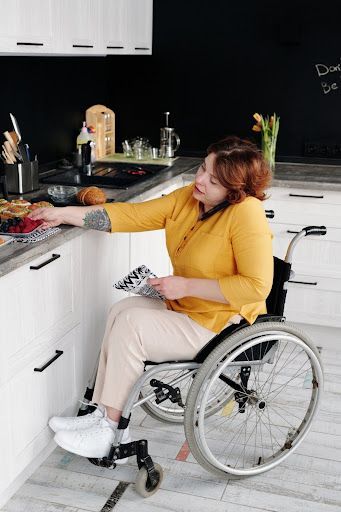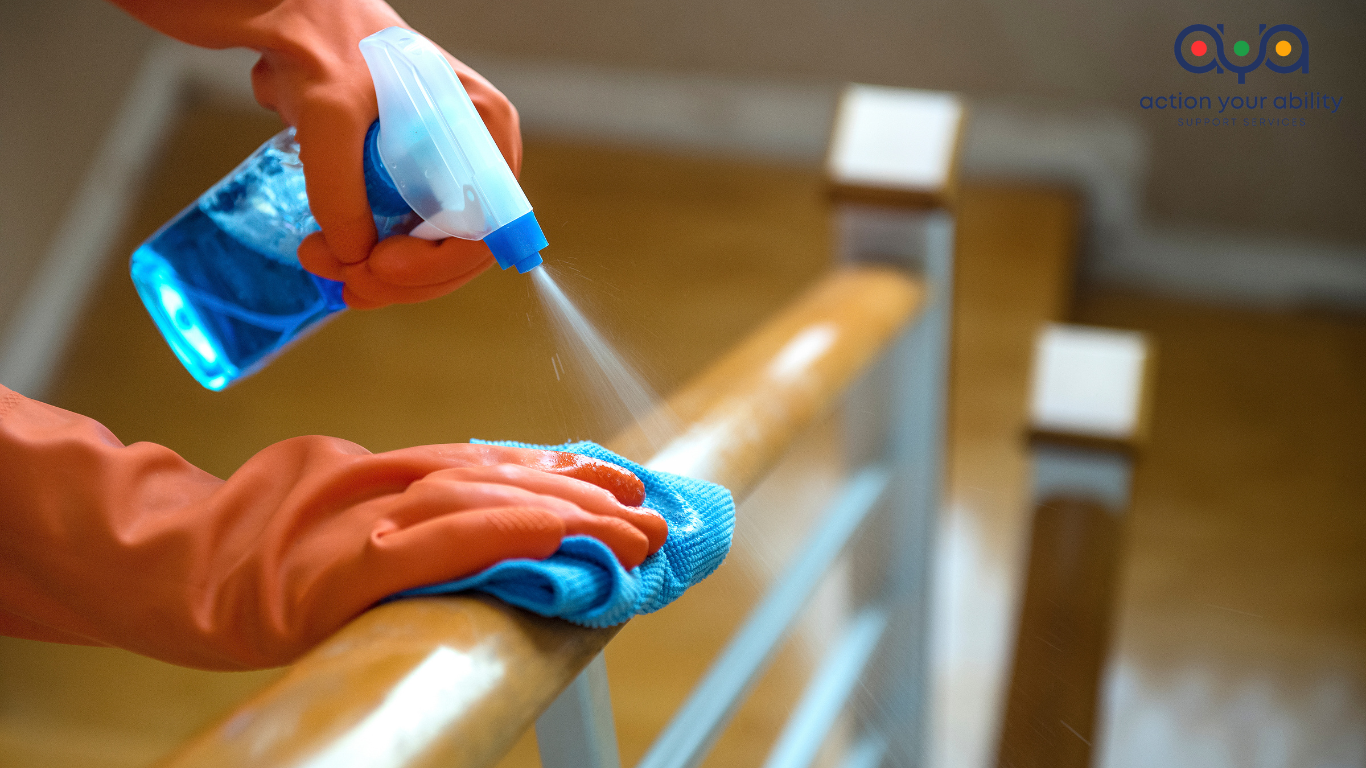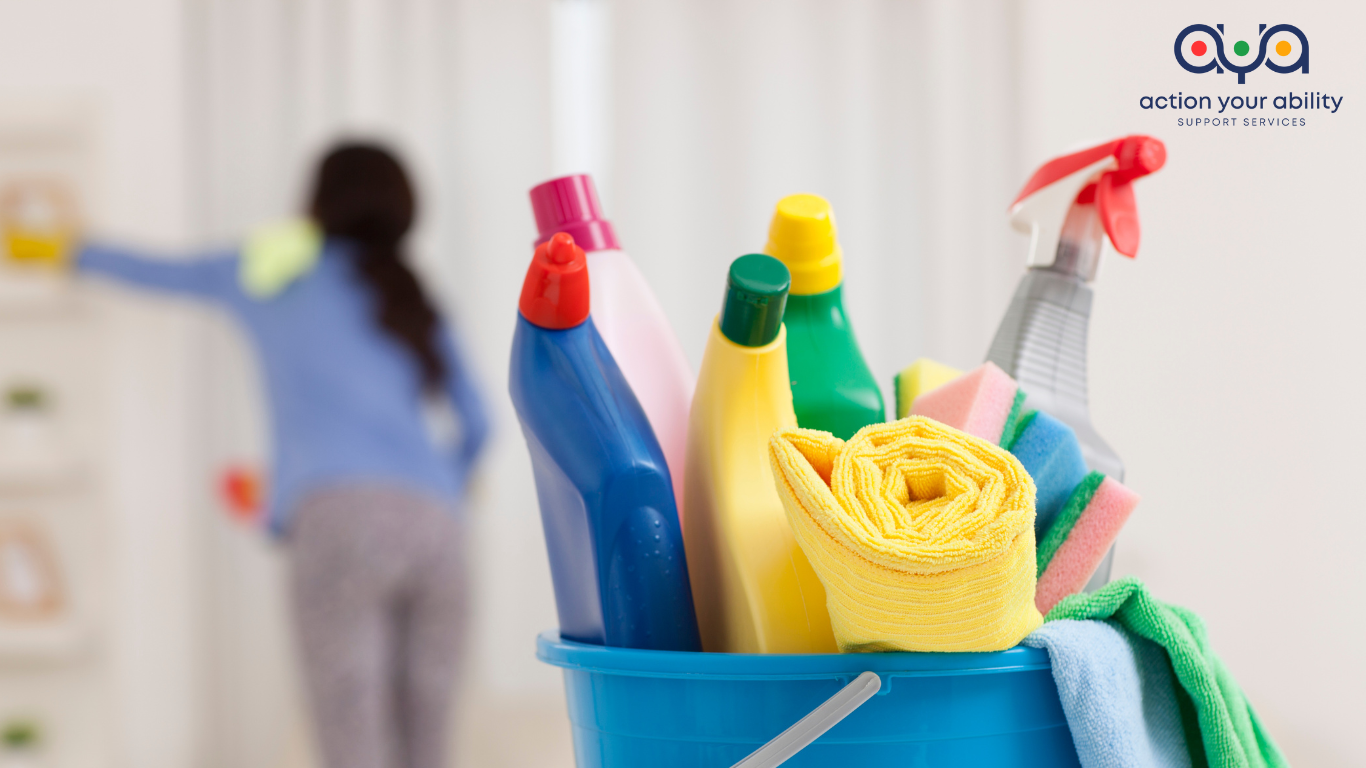Disability Services: Household Tasks Assistance for Independent Living

Disability services that assist with household tasks are crucial in supporting people with disabilities to live independently. These services cover various tasks such as meal preparation and laundry work, ensuring that all daily home chores are handled. Interestingly, the services can be tailored to suit each individual's unique requirements, providing a personalised touch to the necessary aid. It's like having a "custom-made" carer who knows precisely what you need.
Disability services can provide assistance with household tasks such as cleaning, meal preparation, laundry, and organising. Experienced support workers can tailor their approach to meet the specific needs of individuals to ensure a safe and comfortable living environment.
Understanding Disability Services for Household Tasks
Household tasks
like cooking, cleaning, and doing the laundry are everyday chores that might feel simple at first, but can become quite challenging for people living with disabilities. This is where disability services come into play. These services are designed to provide the necessary support to individuals with disabilities, ensuring they can manage and carry out these essential tasks comfortably and independently within their homes.
People with disabilities often face obstacles when it comes to performing simple yet crucial tasks due to physical limitations or medical conditions. Tasks such as meal preparation, house cleaning, grocery shopping, and other essential chores can be demanding, which is why tailored assistance is vital. Disability services aim to bridge these gaps by providing specialised support that meets the unique needs of each individual, enabling them to live their lives with autonomy and dignity.
For instance, a person with limited mobility might find it strenuous to stand for long periods while preparing meals or may struggle to reach high shelves while organising groceries. In such cases, disability services ensure that appropriate accommodations and assistance are provided to make these tasks manageable and less physically taxing.
Furthermore, household task assistance isn't just about physically aiding individuals with disabilities; it's also about fostering independence and boosting confidence. By receiving support tailored to their specific requirements, individuals can not only perform daily activities more effectively but also gain a sense of empowerment and accomplishment in managing their own homes.
Providing this kind of targeted assistance not only simplifies everyday tasks but also fosters a sense of autonomy and pride in individuals with disabilities as they manage their households comfortably and confidently.
Diverse Household Tasks Assistance Provided in Mornington
When it comes to receiving household task assistance for independent living, the options available in Mornington are incredibly diverse. Disability service providers in this region understand that each individual has unique needs and preferences, which is why they offer a wide range of services tailored to meet those needs.
Let's consider an example - Sarah, a young woman with a physical disability who lives in
Mornington. Sarah relies on a wheelchair for mobility and requires assistance with various household tasks. With the support of her disability service provider, she can easily access assistance for tasks such as cleaning, meal preparation, laundry, and even grocery shopping. These services empower Sarah to maintain her independence and live a fulfilling life.
The availability of diverse
household task assistance in Mornington extends beyond physical disabilities. Individuals with cognitive impairments or mental health conditions can also benefit greatly from these services. For instance, someone with an intellectual disability may struggle with organising their belongings or understanding how to complete certain household chores. Disability service providers can offer guidance, support, and specialised strategies to help individuals overcome these challenges and manage their daily tasks effectively.
Some people might argue that relying on assistance for household tasks takes away from an individual's independence. However, the reality is quite the opposite. The goal of these services is not to replace independence but rather to promote it. By providing individuals with the support they need, disabled individuals can actively participate in their own lives while still maintaining control over their activities. It is important to recognise that independence doesn't mean doing everything without any form of support; it means having the freedom to choose how and when you receive the required assistance.
The Importance of Dietary Needs and Meal Preparation
Meeting dietary needs is crucial for everyone, particularly individuals with disabilities. Proper nutrition is essential for maintaining good health and well-being.
Disability service providers play a vital role in addressing these challenges by offering tailored meal preparation services designed to accommodate diverse dietary needs.
One of the most critical aspects of this service is meal planning. This involves collaborating closely with individuals to understand their specific dietary requirements, preferences, and any restrictions they may have. Factors such as allergies, intolerances, or cultural and religious dietary practices are taken into account to personalise meal plans to each person's unique needs, making sure that meals are not only nutritious but also enjoyable.
For instance, someone with diabetes might need assistance in crafting meals that are low in sugar and carbohydrates, while someone with celiac disease would require meals that are entirely gluten-free. Furthermore, individuals with physical disabilities may face cooking challenges due to limited mobility. A disability service provider can offer hands-on assistance with cooking, ensuring that individuals can prepare their meals safely and effectively.
In addition to meal planning and cooking, these services also involve ensuring nutritional balance. Disability service providers emphasise balanced nutrition by incorporating a variety of foods that supply essential nutrients, including fruits, vegetables, proteins, whole grains, and healthy fats. By paying close attention to nutritional content, these providers significantly contribute to the overall health and well-being of individuals with disabilities.
Highlighting Cleaning and Personal Hygiene Support
Cleanliness is vital in our daily lives, not just for appearance but also for health and well-being. For individuals with disabilities, having assistance with regular cleaning tasks can make a big difference in maintaining a comfortable living environment. From dusting to vacuuming and bathroom sanitation, these tasks ensure that their homes are free from allergens and germs, helping to promote better health. Moreover, a clean home reduces the risk of accidents and injuries, providing a safe space to move around.
In addition to regular cleaning duties, there's the matter of personal hygiene support. This includes aiding individuals with personal grooming and self-care routines. Sometimes, these routine tasks prove challenging for people with certain disabilities, so having dedicated support helps them maintain their dignity and comfort.
It's simple to imagine how those who don't experience physical or cognitive challenges might take something as basic as keeping oneself clean for granted. Yet it’s often these little things that are crucial in boosting one's self-esteem and overall well-being.
The Impact of Proper Personal Hygiene
Personal hygiene support addresses various essential activities like bathing or showering, oral care, hair care, and dressing. These are all integral parts of daily life that contribute to an individual's physical, mental, and emotional well-being.
According to the Australian National Disability Insurance Scheme (NDIS), households where people with a disability live have different routines for housework due to the need for personal care (2019).
For some, simple tasks like brushing teeth or combing hair may present significant challenges. However, with assistance from carers or supportive professionals, these individuals can maintain good personal hygiene habits, which has positive effects on their self-esteem and confidence.
So you see, providing support with regular cleaning tasks such as dusting, vacuuming, and bathroom sanitation goes beyond just maintaining tidiness. It impacts the overall health and well-being of individuals with disabilities by creating a safe and comfortable living environment.
Having comprehended the significance of cleaning and personal hygiene support in maintaining a healthy living environment for individuals with disabilities, let's now delve into how this type of assistance contributes towards fostering independence and improving quality of life.
Insights on Clothing Care, Laundry, and Ironing
When it comes to taking care of your clothes, whether they are everyday outfits or special garments, having a reliable system in place is vital. For individuals with physical limitations, this task can be more challenging due to limited mobility or strength. Disability service providers offer valuable assistance with clothing care, laundry, and ironing to ensure that individuals have access to clean and well-maintained clothing. Let's explore some tips and insights for effectively managing these tasks.
- Clothing Care: Accidents happen, and stains and odours affect everyone's clothes at some point. Disability service providers can assist in treating stains promptly and appropriately for different types of fabrics. They can provide useful guidance on the right stain removers to use and the correct techniques for spot-cleaning various fabrics without causing damage.
- Laundry: Managing laundry can feel like a never-ending task for many people. It involves sorting, washing, drying, and folding a variety of fabric types. Disability service providers offer practical support in organising and completing all of these steps efficiently. From separating colours to using suitable detergents for different fabrics, these providers ensure that clothing is laundered properly.
- Ironing: Ironing can be particularly challenging for individuals with limited mobility or strength. Disability service providers understand these challenges and can provide expert ironing assistance to ensure that clothes are wrinkle-free. Additionally, they can advise on appropriate heat settings for different fabrics to prevent damage.
Furthermore, by engaging with disability service providers for assistance with clothing care, laundry, and ironing, individuals with physical limitations can maintain independence in managing their personal attire while also ensuring that their clothing needs are met effectively.
Essential Grocery Shopping Assistance
For many people, grocery shopping may be a routine weekly task but for individuals living with disabilities, this activity can pose significant challenges. It's not just about buying food; it's an essential service that empowers individuals by providing access to necessary supplies, contributes to their independence, and ensures their nutritional needs are met.
Aiding individuals with disabilities during their visit to the store is just one way this service can be provided. It’s not just about being a helping hand; it's more about fostering independence while offering essential support. Sometimes, it’s the little things like reaching for items on high shelves or navigating through crowded aisles that make all the difference.
Furthermore, item selection is fundamental to grocery shopping assistance. Personal shoppers don't just pick items based on a list; they factor in dietary requirements, preferences, and any allergies to ensure nutritious and suitable choices are made. This level of consideration significantly impacts the overall health and well-being of the individual.
Consider Mr. Smith, who uses a wheelchair. His support worker not only helps him navigate the aisles but also ensures he can reach for items without any trouble. They take into account his dietary restrictions due to medical conditions and help him make healthier choices.
While online ordering and delivery are efficient ways to handle grocery shopping, there's something empowering about physically visiting stores and hand-selecting items. For many individuals living with disabilities, the act of shopping in-person provides a sense of independence and normalcy that online solutions can't replicate.
In essence, essential grocery shopping assistance isn't just about picking up groceries; it's about promoting independence, ensuring tailored item selection based on individual needs and preferences, and ultimately contributing to the overall well-being of individuals living with disabilities.
Why Household Tasks Assistance Is Crucial for Independent Living
Performing simple household tasks like cooking or laundry may seem mundane, but for individuals with disabilities, they pose significant challenges.
Household task assistance
bridges this gap, enabling independence and enriching lives. Inability to tackle household chores independently can erode autonomy and self-esteem, leading to frustration and a sense of loss of control. However, with the right support, individuals can regain pride and accomplishment.
Assistance with chores empowers individuals to personalise their living spaces, plan meals, manage hygiene, and maintain cleanliness—essential for restoring dignity and self-worth. Beyond physical upkeep, household task assistance nurtures psychological well-being, creating spaces where individuals feel valued and respected, not defined by limitations. By fostering self-sufficiency and agency, household task assistance is essential for preserving independence and dignity, which is crucial for individuals with disabilities.
Navigating Through Disability Service Providers
When you begin to explore disability service providers, it's natural to feel a bit overwhelmed. Finding an organisation that offers essential services and understands your individual needs is key. Reputable organisations play a crucial role in supporting individuals with disabilities, particularly through high-quality household task assistance that aims to foster independence. The process of finding the right service provider involves carefully considering various factors to ensure that the support offered aligns with your unique requirements.
First and foremost, it's crucial to investigate the range of services offered by a prospective provider. A well-rounded disability service will offer comprehensive support that extends beyond basic household tasks, encompassing important aspects such as respite personal care and community participation assistance. By conducting thorough research into the services provided, you can evaluate whether the organisation offers a robust suite of offerings tailored to assist in creating an inclusive and supportive environment.
Secondly, assessing the expertise and training of the support staff is essential. A knowledgeable and empathetic team can make a significant difference in the quality of care and support you receive. Inquiring about the qualifications, experience, and ongoing professional development opportunities provided to staff members will help you ascertain if the support team aligns with your needs.
Client reviews and testimonials are valuable resources when researching disability service providers. Hearing about others' experiences can provide insight into an organisation's delivery of care, reliability, and client satisfaction. They can also give an indication of whether the provider genuinely fosters overall wellbeing and independence among clients.
Exploring disability service providers can be overwhelming, but by considering these factors, such as service range, staff expertise, client testimonials, and commitment to personalised care, you can identify an organisation that genuinely aligns with your unique needs and aspirations.
Why Choose Us for Assistance With Household Tasks?
Action Your Ability, is dedicated to providing comprehensive and personalised household task assistance tailored specifically to support independent living for individuals with disabilities. We understand the significance of delivering high-quality care and support that respects individual autonomy and promotes inclusivity.
- Actionable Plans: Our approach focuses on practical solutions tailored to your needs.
- Independence is the Goal: We strive to empower you to live autonomously.
- Tailored Services: Customised support that suits your unique requirements.
- Open to CALD & LBGTQ+: Inclusivity is at the heart of our services.
- Integrated with NDIS Providers: Seamless coordination for comprehensive care.
Once we are matched with your support worker, we work towards your goals, no matter how big or small.
Finding the right disability service provider can significantly impact your journey towards greater independence and wellbeing. It's crucial not to rush this decision – take your time to find a provider whose values truly align with your personal goals. If Action Your Ability sounds like a great fit for you or your loved one’s needs,don't hesitate to contact us at (03) 9123 1294.















